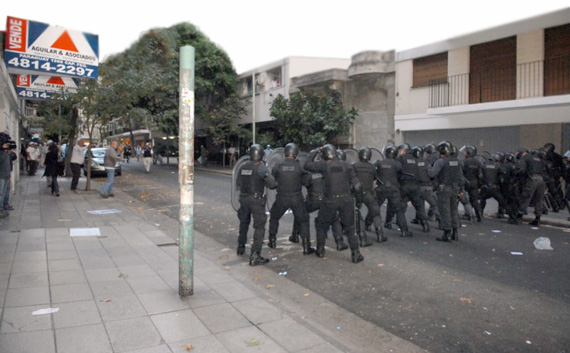|
On May 4, in the middle
of a long and difficult negotiation that had
reached a deadlock, the Union of Tourism,
Hotel and Food Services Workers of Argentina
(UTHGRA) launched a plan of mobilizations
and was brutally repressed by the police in
an action that left dozens wounded and many
more arrested. SIREL spoke with Norberto
Latorre, UTHGRA finance secretary and
president of the Global Committee of the
IUF’s Hotel, Restaurant, Catering and
Tourism Workers Professional Department (HRCT),
who gave his evaluation of this serious
episode.
-How did the Monday, May 4 rally begin?
-We started out in the morning, handing out
flyers in Puerto Madero, a leading
restaurant and hotel district of Buenos
Aires. There we gathered in front of the
Sheraton Hotel, because that’s
the main five-star hotel chain that is
opposing the wage increase we’re demanding.
We protested peacefully, just making noise,
beating the traditional bombo drums and
lighting firecrackers. We then left for the
FEHGRA offices (the Hotel and
Gastronomic Business Federation of the
Republic of Argentina), located some two
kilometers away. We went there by bus,
without cutting off any streets or blocking
traffic.
-What happened there?
-When we got there we were surprised to find
the whole block completely fenced off on all
sides. We couldn’t get near the front of the
FEHGRA offices to protest as we
always do.
-And this is something that doesn’t usually
happen…
-Of course not. Hugo Moyano* occupies
factories, stages sit-ins in businesses and
cuts off roads and there’s never any police
intervention. Why then are we being so
violently repressed now? Why us? I think it
was a political decision made by the
government, namely by the Interior Ministry,
which was directed against our general
secretary, Luis Barrionuevo, and
hotel and restaurant workers in general.
They’ve denied this, but, let me ask you,
who then ordered the police to repress our
peaceful rally if it wasn’t the Interior
Ministry? Who sent out the water cannon
trucks?
-How did the events unfold?
-We had organized a peaceful protest and
FEHGRA officials had simply asked for
normal police protection provided by the
district precinct, which usually appoints a
few police officers to such tasks. But
instead we were met with riot police armed
with clubs and rubber bullet guns, who
charged at us with water cannon trucks. It
was a completely exaggerated operation, with
a ridiculously large and excessively
equipped force. As our protesters began to
move towards the fenced-off area, the police
reacted aggressively, so our people
responded instinctively, reaching for
whatever they could find to defend
themselves. We reacted in self-defense, to
fend off an attack from the police.
-What was the balance of this police action?
-They came down really hard on us, leaving
35 wounded. One person almost lost an eye,
and several people are still hospitalized at
the Güemes health facility. Seventy
unionists were arrested, and even though
they’ve been released, they spent a bad
night in jail. But we’re not going to be
intimidated by this. Far from it. This has
made us stronger, now we’re even more
motivated to continue fighting for our
constitutional right to protest and demand
that our interests as workers be defended.
-What are UTHGRA’s demands now?
-A 30-percent wage increase, which has been
denied by management. After these incidents,
we’ve learned that two five-star hotels are
willing to negotiate, and that the
businesses grouped under FEHGRA,
which represent 90 percent of all the
sector’s activity, will meet on Friday, May
8, and will probably decide to resume
negotiations.
-How is the global crisis impacting the
sector in Argentina?
-In our activity what we’re seeing is mostly
a media campaign orchestrated by companies,
which are using the excuse of the crisis to
deny the wage increase requested. While it’s
true that in 2009 we won’t see the same
level of activity we saw in previous years,
it’s also true that from 2003 to 2008 the
sector accumulated very high earnings.
During this period they gathered a large
enough ‘cushion,’ or reserve, to put them in
a position to grant us the raise we’re
demanding. Besides, even though there have
been cancellations they haven’t even
affected 30 percent of all reservations, and
a hotel with 50 percent occupancy has a good
budget surplus. Any five-star hotel or hotel
with more than 100 rooms that has 30 percent
of its rooms filled is not losing money. We
have experience in that sense because as a
union we manage four hotels and we know what
the costs involved in running each hotel
are. They’ve been operating since 2006 with
an average 90 percent yearly occupancy, so
we can’t accept the companies’ refusal to
give us a raise that is solely aimed at
helping workers recover the purchasing power
they lost with past inflation.
-What are your next steps?
-We have to consider whether we need to
change our strategy or not. But we’re going
to keep fighting. We’re more motivated now
than ever. We’ll probably start taking
direct actions on a company-by-company basis
and then go on to implement strikes on a
regional and national level if necessary.
Workers are earning salaries that are no
longer enough for them to make it through
the entire month, which is why we have so
many workers that are behind this struggle
and why many more will join us as we move
forward.
 |